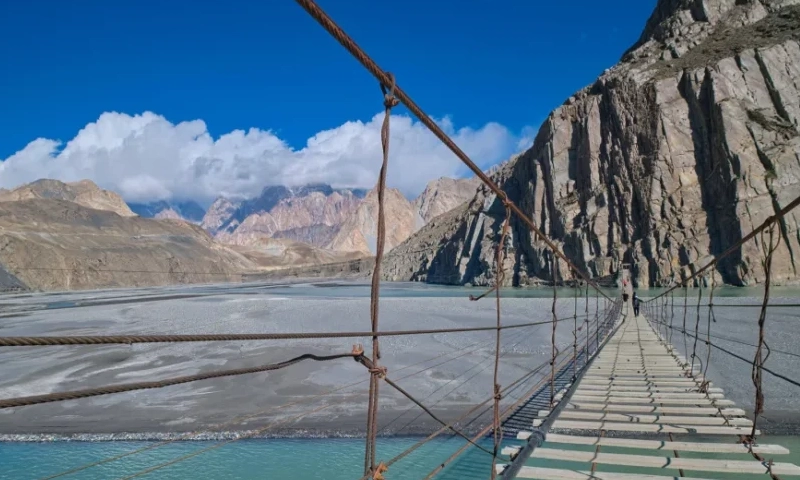- Web Desk
- Feb 24, 2026
Gilgit-Baltistan Land Reforms Bill sails through legislature
-

- Tanveer Abbas
- May 21, 2025

GILGIT: The Gilgit-Baltistan Assembly on Wednesday passed the Gilgit-Baltistan Land Reforms Bill 2024, aimed at overhauling the land utilization and ownership framework in the region.
PPP Gilgit-Baltistan President Amjad Hussain had tabled the bill on Monday. During the three-day-long debate, the opposition staged a walkout, while several prominent activists and leaders of the Awami Action Committee remained imprisoned.
On the first day of the session, the opposition walked out of the House in protest against the government presenting the bill without building consensus among regional stakeholders.
Speaking to the media outside the assembly, Opposition Leader Kazim Mesum criticised the government for what he described as “suspicious activities” in the House and warned against bypassing democratic processes.
“From the river to the mountaintop, this land belongs to the people of Gilgit-Baltistan. No one has the authority to legislate on it without our consent,” he said. However, on Tuesday, the joint opposition re-joined the session with 12 amendments to the bill.
Earlier on Monday, a heated argument between Chief Minister Haji Gulbar Khan and Nawaz Khan Naji nearly escalated to a physical altercation. The situation worsened as both government and opposition members became aggressive, exchanging harsh words and nearly coming to blows. Maulana Fazal Rahim allegedly attempted to hit Naji with a shoe during the mayhem.
On Wednesday, Amjad Hussain presented four amendments on behalf of the government, while Javed Manuwa read proposals from the opposition benches. Later, the House accepted three amendments from the opposition and four from the government, subsequently passing the bill. The opposition did not participate in the voting process.
‘ENEMY OF THE PEOPLE’
Speaking to HUM News English, Kazim Mesum condemned the bill as the “enemy of the people” and said they had tried their best to make the proposed legislation more people-friendly.
“We even came close to a fight with treasury members, but since we do not have a majority, we were unable to prevent it. This bill will trigger protests across the region,” he warned. He said only three out of 12 proposed amendments were accepted.
WHAT IS THE GILGIT-BALTISTAN LAND REFORMS BILL?
The new legislation has abolished the Khalisa Sarkar system and declared it common land.
Hence, in settled districts land, pastures, nullahs described or recorded in revenue records as Khalisa Sarkar, or deemed to be Khalisa Sarkar or Shamilat Deh, ancient barren lands, and pastures where inhabitants have grazing or firewood rights, have been classified as common land.
In unsettled districts, common land means lands, pastures, nullahs, Shamilat Deh, and Khalisa Sarkar situated within the territorial boundaries of the village according to customary laws. Unsettled districts refer to those administrative units of Gilgit-Baltistan for which records of rights, as defined under the West Pakistan Land Revenue Act 1967, have not been prepared.
The Bill further defines natural forests, rivers, lakes, nullahs, streams, glaciers, ponds, common wells and their pathways, mountains, uninhabitable high-altitude seasonal pastures, roads, thoroughfares, playgrounds, graveyards, places designated for religious worship and congregation, archaeological and heritage sites, and places specified for common use as common impartible land. This means such land cannot be apportioned to any individual.
COMMON PARTIBLE LAND: Meanwhile, there is a new category of common partible land, which can be apportioned to individuals. It includes: lands, thangs, undeveloped land which is not owned by the government, lands described as Khalisa Sarkar as per revenue records or customary laws; lands partially occupied, apportioned or developed without legal or customary legitimacy for occupation; culturable waste land; and other naturally occurring usable land which is not under legitimate ownership of any person.
The Bill defines government land as land that has been allotted to, acquired, purchased, or is in the possession of the Gilgit-Baltistan government or any federal government department, institution or authority, or which has been entered in the revenue records of a settled district in the name of the government or any federal government department, institution or authority.
GILGIT-BALTISTAN LAND APPORTIONMENT BOARD: Under the Bill, the government shall constitute a Gilgit-Baltistan Land Apportionment Board (GBLAB), chaired by the chief minister, which will issue policy guidelines to the District Land Apportionment Boards (DLARs) for the apportionment of partible common lands among the Haqdaran-e-Arazee (rightful owners) of the respective Haqdar Mouza or village.
The GBLAB will review, approve, refer for amendments, or reject apportionment plans submitted by the District Land Apportionment Boards through divisional forums.
According to the Bill, there will be a DLAR for each district, responsible for preparing draft apportionment plans of common partible lands under the policy guidelines issued by the GBLAB. The deputy commissioner will serve as the DLAR chairman.
The DLAR will submit the apportionment plan to the divisional commissioner, who will forward the recommendations to the GBLAB for final approval.
For every specific common partible land, there may be one or more Haqdar Mouza or village, whose Haqdaran-e-Arazee shall be entitled to a share therein.
The concerned collector will submit the proposed Haqdar Mouza or village for each common partible land, along with details of groups of permanent residents of the village or Mouza having legal or customary rights, for the approval of the Commissioner.
On the other hand, the partible land – including adjacent smaller parcels within every tehsil of a district – shall be identified, measured, and given a distinctive name.
The assistant collector shall, using a format prescribed by the Board of Revenue, determine the Haqdar Mouza or village along with details of groups of permanent residents having legal or customary rights, and submit the same for the Collector’s consideration.
After due consideration, the collector shall issue preliminary notifications determining the Haqdar Mouza or village for every specific common partible land within his jurisdiction. Following verification, a final list of Haqdar Mouza will be issued. The Bill says that 10 per cent of common partible land will be reserved for public purposes.




